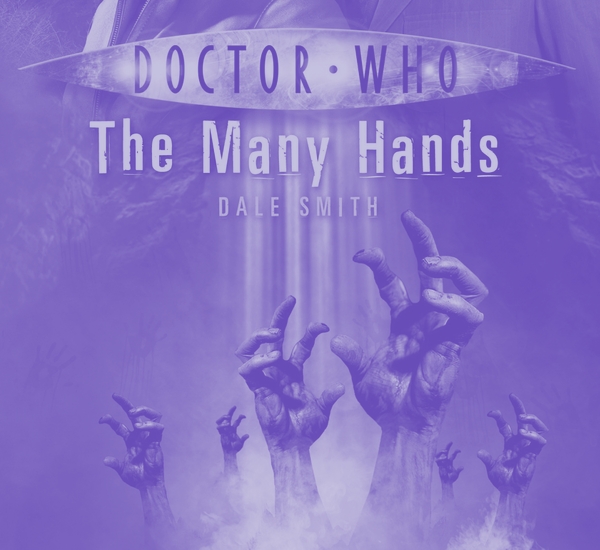It’s potent and creepy enough to keep your interest on its own, but the book is also a clever experiment in atmosphere and a surprisingly ripping read.
Writing for a spin-off novel means you are writing for an audience who have bought your book because of one of the names on the cover, but not yours. This is a good thing: not only do more people read your book, but more people are happy to share their unvarnished opinions of your work. For a long time, I decided that the best thing to do with reviews was read them as if they had no connection to you or your work, good and bad alike. But I’m starting to realise that if you take the time to decide if you agree with them or not, they can be just as useful as any other feedback for identifying your strengths and weaknesses as a writer.
The Many Hands received a lot of reviews, and on the whole it was well-received. It has around 3.5 stars out of 5 on LibraryThing, and the same on Good Reads. The reviews there range from the great (“Fantastic very creepy exciting !!! great story !!!!”, says Nightmagic Magic) to the awful (“rubbish, only for under fives”, says Wayne) but a few themes do assert themselves, that are echoed in the other reviews.
In terms of style and tone, Smith’s writing put me very much in mind of Mark Gatiss – very dark and very funny; very intelligent and informed.
The characterisation of the leads was very good: “the author did a lovely job of capturing the personalities of the actors” said Kathryn, or “Every time the Doctor was saying something or doing something in the book it was very easy to read it in David Tennant’s voice and visualize him acting that way” according to Megan. This echoed David Darlington in TV Zone (“The story … uses the Doctor and Martha well”) and MM in Doctor Who Magazine (“a picture perfect version of David Tennant [and] … Smith gives us a brilliant take on Martha”). Also generally praised is the use of Edinburgh: “the streets depicted [are] familiar to anyone who’s visited Edinburgh’s Old Town, allowing Dale Smith to create a more satisfying atmosphere” said Anthony Brown in Starburst, and Stuart Ian Burns of Behind the Sofa enthused “in places you can smell the squalor, the hopelessness of people trying to make ends meet and the primitive lifestyle of a population still on the edge of industrialisation”. This is good, because those are two things I very much wanted to get right when I started to write.
The story itself, though, was generally thought to be weak: wen Williams of DeathRay thought it entertaining but “plotted like a videogame, culminating in a boss battle with a super-zombie”, and one Amazon reviewer said “it takes about sixty pages to really get going”. For some, the pace and incident of the opening worked: VB of Doctor Who Magazine said the “story bursts into life with an opening that’s pretty hard to beat” and Starburst gave “bonus points for jumping straight into the plot”, but for those that weren’t swept away it was less successful: “it’s .. surprisingly cartoonish, the plot amounting to little more than monsters chasing our heroes up and down the Royal Mile like an overly lurid episode of Scooby Doo” said Paul Kirkley in SFX, and it’s Stuart Douglas who identified “the problem is that there’s not a lot of time given over to anything other than moving the story on via one action scene after another”.
After a wildly exciting opening, featuring a Doctor fighting a revivified corpse on the roof of a careering stagecoach, The Many Hands develops into a full-blooded sci-fi horror story complete with plenty of memorably eerie touches.
Once the Doctor managed to get back up to the top of the Royal Mile, some people were eventually won over. “The beginning was a bit iffy, but by the end I thought it was pretty good,” said Cynthia on GoodReads, and Gareth agreed “If the first half is essentially an extended chase sequence on foot, the second half ramps up the pulp horror [with] some lovely turns of phrase and black humour”. Even Stuart Douglas, who had been most disappointed in the first part, suddenly found it transformed: “It’s almost like two completely different novels: the first suffering from the usual NSA issues and the second an excellent Gothic horror/cool steampunk (sort of) sf novel.” But the general feeling is that the book has pacing problems: too much time is given to set-piece and spectacle - with some scene-setting and character introduction - and it takes too long for the hands to appear en masse.
On the whole, the book was perhaps seen as unambitious but entertaining - for example, Louise Dennis said “I don’t think it particularly rises above (what I presume was) its brief as a historical action-adventure runaround but it does what it does very well.” and David Darlington agrees “Perhaps not the most original story in the world, [but] The Many Hands nevertheless hits all its target objectives”. But for those who really enjoyed Heritage, such as Robert Smith?, it was a disappointment: “After the brilliant Heritage, back in 2002, he finally produces a second Doctor Who novel and it turns out to be… very mediocre indeed”.
